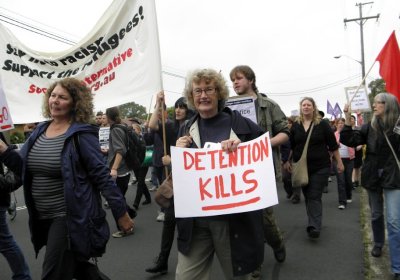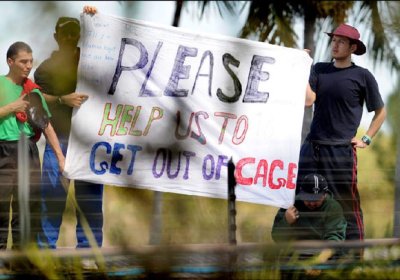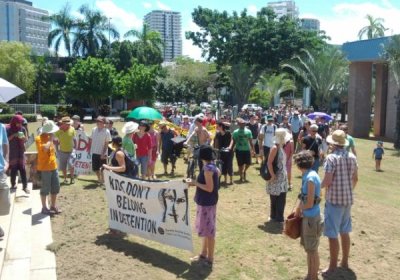Private-detention centre operator Serco and the department of immigration have taken steadily more aggressive action to prevent refugees in detention from speaking out about their conditions. They have done this by moving to restrict and curtail visits to detainees, and have banned several individuals.
Jay Fletcher
What would Australia look like if Tony Abbott became the next prime minister?
The Liberal leader is an outspoken climate denier, a hardliner on locking out refugees, determined to crack down on union and workers’ rights and wants to extend racist and draconian attacks on Aboriginal rights.
Yet polls have consistently shown Abbott and the Coalition far ahead of the Julia Gillard Labor government, whose pro-business policies and internal scandals have made it deeply unpopular.
Refugee lawyer David Manne and a pro bono legal team will take the federal government and ASIO to the High Court to challenge the indefinite detention of refugees found to be “security threats”.
The case will argue that refugees should be told the full reasons for ASIO's decision, so they are able to appeal adverse findings.
Manne said the situation now is “like being sentenced to life imprisonment without even having been charged, tried and convicted. It's a secret trial”.
Attorney-general Nicola Roxon is planning a raft of new powers for ASIO to intercept and store any individual’s information. The move follows the adoption of new laws that allow Australia’s spy agencies to target individuals and organisations that oppose the government's interests — nicknamed the “WikiLeaks amendment”.
Several proposed changes to telecommunications interception and access laws, as well as the Intelligence Services Act 2001, would expand ASIO’s powers of surveillance and reduce government oversight of ASIO activities.
More refugees confronted with a lifetime in immigration detention because of an “adverse” security check by ASIO are being driven to suicide attempts and self-harm.
Over only a few days, more than 1000 families from 60 Australian cities and towns volunteered to host asylum seekers awaiting a protection visa, under a government scheme to release more refugees from detention.
From next month, the Australian Homestay Network, the Red Cross and the federal government will coordinate to place asylum seekers released from detention on bridging visas in Australian households for a six-week stay.
Online campaigner GetUp! made a call-out to its members on May 3 and the Homestay network wrote to its 5000-member base asking for help.
A letter written by a 10-year-old girl in detention in Darwin drew national attention on April 24 and voiced the “sad, depressing and hopeless” lives children and young people experience in detention.
The note, hand-written in Vietnamese, was given to a local community visitor from the Darwin Asylum Seeker Support and Advocacy Network.
It said: “As each day passes, we feel heavy-hearted and lacking any sense of hope. We have no way of knowing what our future holds for us.”
The immigration department ordered 22 asylum seekers be taken to Sydney’s Silverwater jail after protests in Villawood detention centre last Easter. But the department did not keep a complete record and failed to follow its own procedures or visit the detainees within the 24 hours required.
On the advice of federal police, the Iranian and Kurdish asylum seekers were forced out of Villawood in the early hours of April 22 last year, accused of being the “ring leaders” of the spate of protests that took place over the Easter weekend.
In recent weeks, a boat with more than 120 refugees was forced back to Indonesia under Australian orders, 10 Falun Gong members from China docked at Darwin’s wharves and another boat made several distress calls to Australia before vanishing.
The first boat was on its way to Christmas Island when it began taking on water. A Singapore-flagged ship rescued the 120 Afghan and Iranian refugees onboard and took them back to Merak, Indonesia.
Seven people from multiple Australian cities were arrested today while climbing a hill to make contact with refugees inside the Wickham Point detention centre outside Darwin.
About 35 refugee activists from Darwin, Sydney, Perth, Brisbane and Melbourne were at the centre as part of several actions that took place outside the city’s three detention centres over the Easter long weekend for the annual refugee convergence.
The near-continuous introduction, change and reversal of several federal government policies on asylum seekers arriving by boat have had a severely damaging effect on refugees held in the Northern Immigration Detention Centre in Darwin.
An Iranian man who arrived on Christmas Island just after the government announced it would “swap” 800 asylum seekers in Australia for 4000 refugees from Malaysia, said he was told every day he would be deported. “It was the worst two months of my life.”
About 120 refugee rights activists from multiple Australian cities gathered outside the Northern Territory’s parliament house in Darwin today to protest against mandatory detention and the three detention centres located around the region.
The event kicked off protests that are taking place at the detention facilities over the Easter long weekend for the annual refugee convergence. Each year refugee activists gather at a place in Australia where refugees are held in remote or difficult-to-reach location.
- Previous page
- Page 10
- Next page










